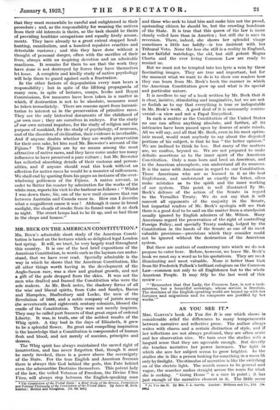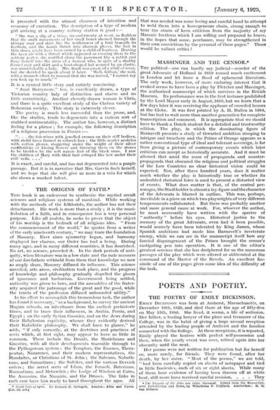AS YOU SEE IT.*
Mess. GARVIN'S book As You See It is one which shows in considerable relief the differences to many temperaments between narrative and reflective prose. The author always writes with charm and a certain distinction of style, and if her reflections are not always profound, they are often acute and her observation nice. We turn over the studies with a languid sense that they are agreeable enough. But directly she touches narrative her power increases. The light in which she sees her subject seems to grow brighter. In the studies she is like a person looking for something in a room lit only by firelight. The stimulus of narrative is like the switching on of the electric light. The search ceases to be general and vague, the searcher makes straight across the room for what she is seeking. " Going Home " is a case in point ; it has just enough of the narrative element in it. The little scene • As You Sc. B. By Mrs. J. L. Garvin. London : Methuen and Co., Ltd. tea. asIJ
is presented with the utmost clearness of intention and economy of execution. The description of a type of modern girl arriving at a country railway station is good :—
" She was a slip of a thing, six-and-twenty at most, so fleshless that the swift movements of her small bones showed through the skimpy coat and skirt like the restlessness of a bird beneath its feathers, and the hands thrust into chamois gloves, the feet in thin shoes, might have been owned by a child of fourteen. Braving the keen air with a throat which appeared as evening dress to the solitary porter, she scuttled along the pavement like a rabbit and flung herself into the arms of a woman who, in spite of a shabby flannel coat and skirt and a boat-shaped hat secured by an elastic, was unmistakably a lady. Mrs. Rush was aware of a whiff of scent,
but she decided to speak about it later. Well, Gillian,' she said, with a staunch effort to conceal that she was moved, ' I cannot say you look up to much.' "
It is a cynical little story and entirely convincing.
" Aunt Barrymore," too, is excellently drawn, a type of Victorian country lady of distinction and charm and no little eccentricity. Another cleverly-drawn woman is Chris, and there is a quite excellent study of the Chelsea variety of Bohemian society. This story is extremely clever.
The poetry• is much less successful than the prose, and, like the studies, tends to degenerate into a curious sort of crabbed sentimentality. The author has, however, a distinct feeling for a phrase ; for example, the following description
of a religious procession in France
. . . the fish-wives with jewelled crosses on their stiff bodices, with stolid faces framed in cobweb lace ; the little scarlet acolytes with cotton gloves, staggering under the weight of their silver caiallesticks or kissing flowers and throwing them on the stones to be trodden by the soft square feet of the black nuns. I saw the children of Mary with their hair crimped like tow under their stiff veils. . . ."
It is exact, and careful, and has not degenerated into a purple passage. But it is in narrative that Mrs. Garvin finds herself, and we hope that she will give us more in a vein for which she shows a marked talent.



















































 Previous page
Previous page